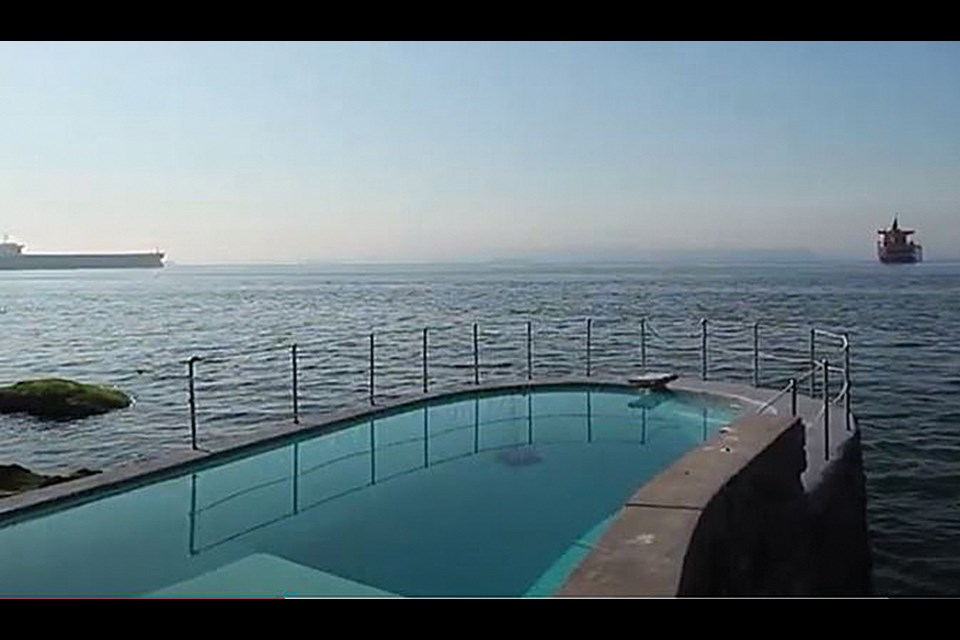A West Vancouver waterfront property owner has failed in her bid to take permanent legal possession of a swimming pool that juts out onto the publicly owned foreshore and ocean.
The pool was built in 1949 by Ken and Louise Russell at their Sandy Cove home on the 3900 block of Marine Drive. At high tide, the pool is surrounded on three sides by Burrard Inlet. In 2015, current owner Heyan Wan bought the property from the Russell estate for $7.2 million while she was still living in China, according to a B.C. Supreme Court decision handed down last week.
The pool was part of the marketing of the home, Justice Heather MacNaughton noted in her decision, and a major factor in Wan’s decision to buy the property.
The foreshore the pool is built on belongs to the province and is leased by the District of West Vancouver. In late 2014, before the purchase went through, District of West Vancouver staff informed Wan via letter that the pool was an encroachment but that she could receive a temporary licence allowing her continued use, according to the court ruling.
The licence, though, forbade Wan from “replacing, expanding, altering, adding to, or substantially repairing the encroachments without the permission of the district’s risk manager,” the ruling states, and it also included a clause that the district would have the power to terminate the licence with 30 days’ notice with no need to provide a reason.
Soon after the purchase went through, Wan hired contractors to demolish the original home and build a new one, and do a renovation of the pool (though the building permit did not include the pool renovations, the judge noted). Contractors installed gravel material and rebar for the purposes of relining the pool in concrete to address leaks from cracks in the pool’s perimeter wall, the ruling states.
When the district’s plumbing inspector visited the site in 2018, he learned the pool’s chlorinated water was draining directly into the ocean, which he said was “unacceptable,” MacNaughton wrote.
Contractors told district staff the pool’s walls had cracks and that only minor work needed to be done to “make use of the pool safe and bring it to current code.” In October 2018, district staff wrote to Wan, denying permission to do renovations on the pool and issuing notice the licence would be terminated in 30 days, the ruling states.
In their letter, staff explained the rationale: The district does not seek to penalize people who buy a property with an encroachment but, when that encroachment reaches the end of its useful life, it should be removed.
Wan filed a lawsuit seeking a judicial review of staff’s decision, and staff rescinded their notice to terminate the licence.
Wan filed a separate petition in B.C. Supreme Court naming the province and the district, asking for an order that the title for the foreshore area the pool is built on be turned over to her, with compensation paid to the province. If the courts would not agree to that, Wan’s request was for permission to repair the pool and a 30-year easement, along with an order barring the district from cancelling the licence or ordering her to demolish the pool.
In deciding whether Wan should be entitled to a vesting order or easement for the foreshore, MacNaughton had to evaluate whether Wan was under an honest but mistaken belief about the location of the property line, the scope of the work to remove the pool and how its removal would change the value of the property.
In each respect, MacNaughton sided with the province and the district.
“She closed the purchase of the property knowing the terms of the licence she had signed. She cannot argue that she relied on any representations from the province, or for that matter the district, about the nature of the interest she was entitled to with respect to the encroachments. It could not have been clearer,” MacNaughton wrote. “Given the size of that investment, Ms. Wan should have exercised due diligence signing the licence. A reasonable person making such an investment would have ascertained exactly what her rights were with respect to the encroachments and the terms of the licence. Having not done so, she cannot now say that she did not understand it or is not bound by its terms.”
The cost of removing the pool and an adjacent boat ramp would be “modest” McNaughton concluded, especially when compared with the price of the property.
And MacNaughton made clear, there are “good policy reasons” why the foreshore should not be vested in private hands – that the Crown has an obligation to consult with Indigenous peoples who may have title, or rights claims, and that the intent of the legislation behind a public foreshore is to preserve it for public use and environmental protection.
MacNaughton concluded her ruling saying the district may issue a new notice to cancel Wan’s temporary licence for continued use of the pool and order its demolition, which she would be free to contest in court.
According to the district, Wan’s temporary foreshore licence is also now under review.
The property was last assessed at more than $12.6 million.

.jpeg;w=120;h=80;mode=crop)

